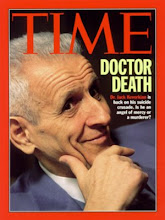Pro: Proponents of euthanasia believe that it is acceptable because it helps people die a dignified death. They think that when death is in sight and damage to health is irrevocable, euthanasia is a way to ease suffering and end the pain. Additionally, they feel that being able to die before the illness takes over body and mind helps to keep a patient’s quality of life from deteriorating. Financially, many argue that once a person has shown no signs of life, for example when they’ve been unconscious or in a coma for a long period of time, it is more sensible to remove the expensive forms of life care that are keeping the brain-dead person alive. That way, the family will not be plagued by expensive health bills resulting from futile efforts to nourish a person who shows no sign of recovering. Furthermore, with advance directives like living wills and health care proxies, it is legal that treatment can be withheld and proponents of euthanasia argue that if that is legal, other forms of euthanasia should be as well. They feel that a doctor is not going against his job if he can “let die” rather than kill the patient.
Con: People who oppose euthanasia are very passionate about their arguments. Many feel that it is God’s decision that mandates who should be taken and when they should be taken from the earth. They feel that it is not a doctor’s right to make the decision about whether a person should live or die. Furthermore, the church condemns euthanasia and considers it to be murder. Other groups are focused more on the legal aspect of euthanasia rather than the religious. They claim it goes against the Hippocratic Oath of a doctor and places them in the position of being sued or arrested. Additionally, they worry about the individuals who are in a coma or otherwise unable to voice their opinions and who don’t have advance directives. They believe that if someone cannot express what they wish to happen to them, it is not the doctor’s right to decide whether or not they will survive.
Me: I believe that there are certain forms of acceptable euthanasia and other types that are immoral. I sympathize with people who claim that the quality of life is greatly diminished once someone succumbs to a disease and they cannot ever recover. I also believe that it is a patient’s individual right to decide if they want to withhold treatment or not. I don’t, however, believe a doctor should administer a drug for the purpose of killing someone nor do I feel they should prescribe medicine for a person to take with the intention of killing themselves. I think if a person really wants to die, it is not the doctor’s job to make that happen.
Subscribe to:
Post Comments (Atom)

Ok, so after having read your compromise for the pro and con argument, I am a little confused. You say that it is the patient's right to withhold treatment if he or she wants to, leading ultimately to death, but you say that you do not think it right for a doctor to aid in the 'killing' of another person, leading, also, to the ultimate end of death. What, then, is your distinction between what is right and acceptable and what is not? Where do you draw the line between a doctor purposefully not treating a patient, thereby causing death, and administering a fatal treatment, thereby causing death? I know you have a good point, but I think it's not quite there yet.
ReplyDeleteAfter reading your arguments i can see how Tyler may be a little confussed. His questions were valid and should be answered within your research in order to make your argument more understandable. However when talking to you about it during class before you created this particular blog post i thought you expressed your idea in a clearer way, so i do not think that you will have a problem articulating it in your arguments as long as you explain the different types of euthanasia and the circumstances like you explained them to me.
ReplyDelete